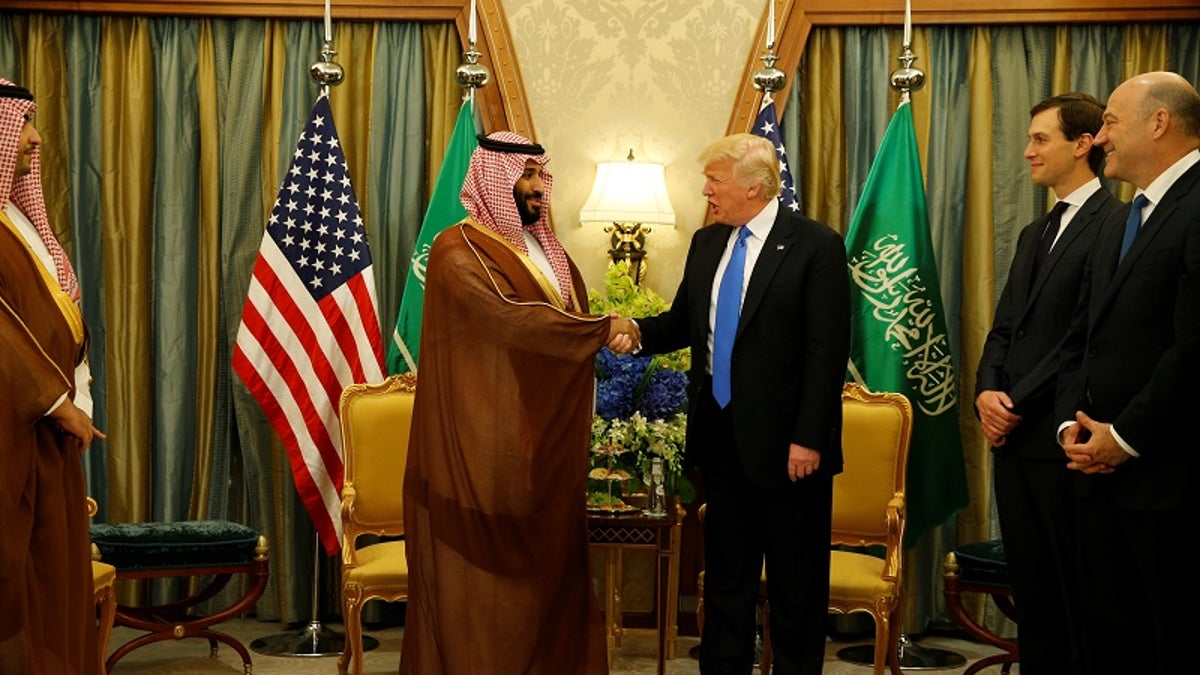
FILE -- President Donald Trump meets with Saudi Arabia's Deputy Crown Prince and Minister of Defense Mohammed bin Salman (center L) at the Ritz Carlton Hotel in Riyadh, Saudi Arabia May 20, 2017. (REUTERS/Jonathan Ernst)
Mohammed bin Salman’s selection as crown prince to King Salman bin Abdul Aziz is a positive move for the Kingdom of Saudi Arabia and U.S.-Saudi relations. While the precise timing of this event was uncertain, the move itself was inevitable given the steady expansion of the now-Crown Prince’s domestic and international portfolio and his role in spearheading the Kingdom’s push toward economic diversification, reform, and answering President Trump’s call for U.S. allies to play a more proactive role in providing for their own security and defense.
The transition, occurring under the auspices of King Salman who is, perhaps, the last of the sons of the Kingdom’s founder, King Abdul Aziz ibn Saud, with the prestige, stature, and influence to adeptly orchestrate such a significant move, was executed quickly, smoothly, and elegantly and, most importantly, with the strong backing of the Royal Family and the influential clerical establishment. Significantly, former Crown Prince Mohammed bin Nayef, who had been next-in-line to the throne, quickly and publicly swore baya’a (the oath of allegiance) to Prince Mohammed, a symbolic but significant gesture given by members of the Royal Family and key pillars of Saudi society to signify their support for a new leader.
The designation of Mohammed bin Salman as Crown Prince eliminates uncertainty over who would succeed the 81-year-old King Salman. Speculation in the press and on social media, the latter serving as the Kingdom’s public forum, on a looming succession “competition” or, among more histrionic observers, a “crisis” which could have jeopardized the Kingdom’s push for reform, have been put to rest.
Crown Prince Mohammed’s youth and charisma have made him a popular figure in a country where the median age is approximately twenty-seven.
The quick consolidation of the Royal Family behind Crown Prince Mohammed is a clear vote in favor of continuity of current policies; most importantly, the Kingdom’s concerted push toward economic diversification and gradualist political reform, which includes modernizing and restructuring the religious establishment and greater empowerment of women. It is also the clearest indicator that the ongoing generational transfer of power within the Kingdom is permanent. Crown Prince Mohammed’s youth and charisma have made him a popular figure in a country where the median age is approximately twenty-seven.
It is also a clear win for the United States. Prince Mohammed is very pro-American and places a premium on the military and security relations – economic and trade relations as well – the two countries enjoy. Following the election, he moved quickly to forge a close connection with the Trump administration; the president’s decision to travel to Riyadh for his first overseas visit happened, in large measure, thanks to the success of Prince Mohammed’s outreach to the White House.
The burgeoning relationship between President Trump and the Crown Prince has helped initiate a reset of U.S.-Saudi relations, which had reached a nadir under the Obama administration. This has yielded dividends for the Kingdom – most notably the Trump administration’s decision to expedite a potentially $110 billion arms sale – and for the United States as well. During the Riyadh Summit, President Trump outlined a new foreign policy vision which would not only see key regional allies play a greater role in providing for their own security and defense, but in which regional powers like Saudi Arabia would take the initiative in moving decisively to tackle sources of extremism and terrorism. The Kingdom’s decision, with the UAE, Egypt and Bahrain, to cut diplomatic ties with and isolate Qatar, which has long openly backed anti-American Islamist groups, can be seen, at least in part, as a move by the Crown Prince to support the president’s call.
The Kingdom’s decision, with the UAE, Egypt and Bahrain, to cut diplomatic ties with Qatar, which has long openly backed anti-American Islamist groups, can be seen in part as a move by the Crown Prince to support President Trump's call to take the initiative in tackling sources of extremism.
Crown Prince Mohammed is not an unknown quantity. Since becoming Deputy Crown Prince in April 2015, he has effectively served as the Kingdom’s CEO on both foreign and domestic policy. He was the chief architect behind Vision 2030, Saudi Arabia’s blueprint for economic diversification and reform. As chairman of Saudi Aramco, he is playing a key role in restructuring one of the globe’s largest companies and in paving the way for the state-run entity’s IPO later this year. As chairman of the Public Investment Fund, he drove the decision to transform that sleepy institution into the world’s largest sovereign wealth fund. Prince Mohammed also curbed the powers of the religious police, established the General Authority for Entertainment (part of a larger initiative to promote tourism), introduced new measures to roll back subsidies and levy taxes and established an anti-terrorist alliance of Islamic countries.
He first entered government in 2009 as a special advisor to the Governor of Riyadh Province. In 2011, he joined his father, then Second Deputy Prime Minister and Minister of Defense’s court as a special advisor, serving, over the next few years, as head of the Crown Prince’s Court, Advisor to the Minister of Defense, Governor of Eastern Province, and Minister of State. In 2015, he was appointed Minister of Defense where he oversaw Operation Decisive Storm, the Kingdom’s move to counter the advances of Iranian-backed Houthi militants in Yemen. In that year, he also became Secretary-General of the Royal Court and, critically, chairman of the newly-established Council for Economic and Development Affairs.
In this context, this appointment is the next logical step in what has been a steady accumulation of responsibilities stretching back eight years. It is a signal of continuity, a win for stability, a win for Saudi reformers, and a win for the United States.
